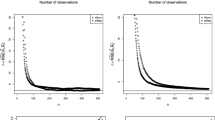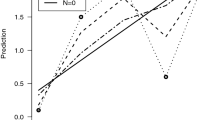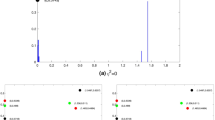Abstract
We study the consistency of parameter estimators in adaptive designs generated by a one-step ahead D-optimal algorithm. We show that when the design space is finite, under mild conditions the least-squares estimator in a nonlinear regression model is strongly consistent and the information matrix evaluated at the current estimated value of the parameters strongly converges to the D-optimal matrix for the unknown true value of the parameters. A similar property is shown to hold for maximum-likelihood estimation in Bernoulli trials (dose–response experiments). Some examples are presented.
Similar content being viewed by others
References
Atkinson A, Donev A (1992) Optimum experimental design. Oxford University Press, NY, USA
Chaloner K, Larntz K (1989) Optimal Bayesian design applied to logistic regression experiments. J Stat Plan Inference 21: 191–208
Chaloner K, Verdinelli I (1995) Bayesian experimental design: a review. Stat Sci 10(3): 273–304
Chaudhuri P, Mykland P (1993) Nonlinear experiments: optimal design and inference based likelihood. J Am Stat Assoc 88(422): 538–546
Chaudhuri P, Mykland P (1995) On efficiently designing of nonlinear experiments. Statistica Sinica 5: 421–440
Downing D, Fedorov V, Leonov S (2001) Extracting information from the variance function: optimal design. In: Atkinson A, Hackl P, Müller W(eds) mODa6—advances in model-oriented design and analysis. Physica Verlag, Heidelberg, pp 45–52
Dragalin V, Fedorov V (2006) Adaptive designs for dose-finding based on efficacy–toxicity response. J Stat Plan Inference 136: 1800–1823
Fedorov V (1972) Theory of optimal experiments. Academic Press, New York
Fedorov V (1980) Convex design theory. Math Operationsforsch. Statist Ser Statistics 11(3): 403–413
Ford I, Silvey S (1980) A sequentially constructed design for estimating a nonlinear parametric function. Biometrika 67(2): 381–388
Ford I, Titterington D, Wu C (1985) Inference and sequential design. Biometrika 72(3): 545–551
Hu I (1998) On sequential designs in nonlinear problems. Biometrika 85(2): 496–503
Jennrich R (1969) Asymptotic properties of nonlinear least squares estimation. Ann Math Stat 40: 633–643
Kiefer J, Wolfowitz J (1960) The equivalence of two extremum problems. Can J Math 12: 363–366
Lai T (1994) Asymptotic properties of nonlinear least squares estimates in stochastic regression models. Ann Stat 22(4): 1917–1930
Lai T, Wei C (1982) Least squares estimates in stochastic regression models with applications to identification and control of dynamic systems. Ann Stat 10(1): 154–166
Melas V (1978) Optimal designs for exponential regressions. Math Operationsforsch und Statist, Ser Statistics 9: 753–768
Müller W, Pötscher B (1992) Batch sequential design for a nonlinear estimation problem. In: Fedorov V, Müller W, Vuchkov I (eds) Model-Oriented Data Analysis II. Proceedings 2nd IIASA Workshop, St Kyrik (Bulgaria), May 1990. Physica Verlag, Heidelberg, pp 77–87
Pázman A, Pronzato L (2004) Simultaneous choice of design and estimator in nonlinear regression with parameterized variance. In: Di Bucchianico, A, Läuter H, Wynn H (eds) mODa’7—Advances in model-oriented design and analysis. Proceedings of the 7th international workshop, Heeze (Netherlands). Physica Verlag, Heidelberg, pp 117–124
Pázman A, Pronzato L (2007) Quantile and probability-level criteria for nonlinear experimental design. In: López-Fidalgo J, Rodríguez-Díaz J, Torsney B (eds) mODa’8—Advances in model-oriented design and analysis. Proceedings of the 8th international workshop, Almagro (Spain). Physica Verlag, Heidelberg, pp 157–164
Pronzato L, Walter E (1985) Robust experiment design via stochastic approximation. Math Biosci 75: 103–120
Pronzato L, Walter E (1988) Robust experiment design via maximin optimization. Math Biosci 89: 161–176
Rosenberger W, Flournoy N, Durham S (1997) Asymptotic normality of maximum likelihood estimators for multiparameter response-driven designs. J Stat Plan Inference 60: 69–76
Shiryaev A (1996) Probability. Springer, Berlin
Wu C (1981) Asymptotic theory of nonlinear least squares estimation. Ann Stat 9(3): 501–513
Wu C (1985) Asymptotic inference from sequential design in a nonlinear situation. Biometrika 72(3): 553–558
Wynn H (1970) The sequential generation of D-optimum experimental designs. Ann Math Stat 41: 1655–1664
Author information
Authors and Affiliations
Corresponding author
Rights and permissions
About this article
Cite this article
Pronzato, L. One-step ahead adaptive D-optimal design on a finite design space is asymptotically optimal. Metrika 71, 219–238 (2010). https://doi.org/10.1007/s00184-008-0227-y
Received:
Published:
Issue Date:
DOI: https://doi.org/10.1007/s00184-008-0227-y




